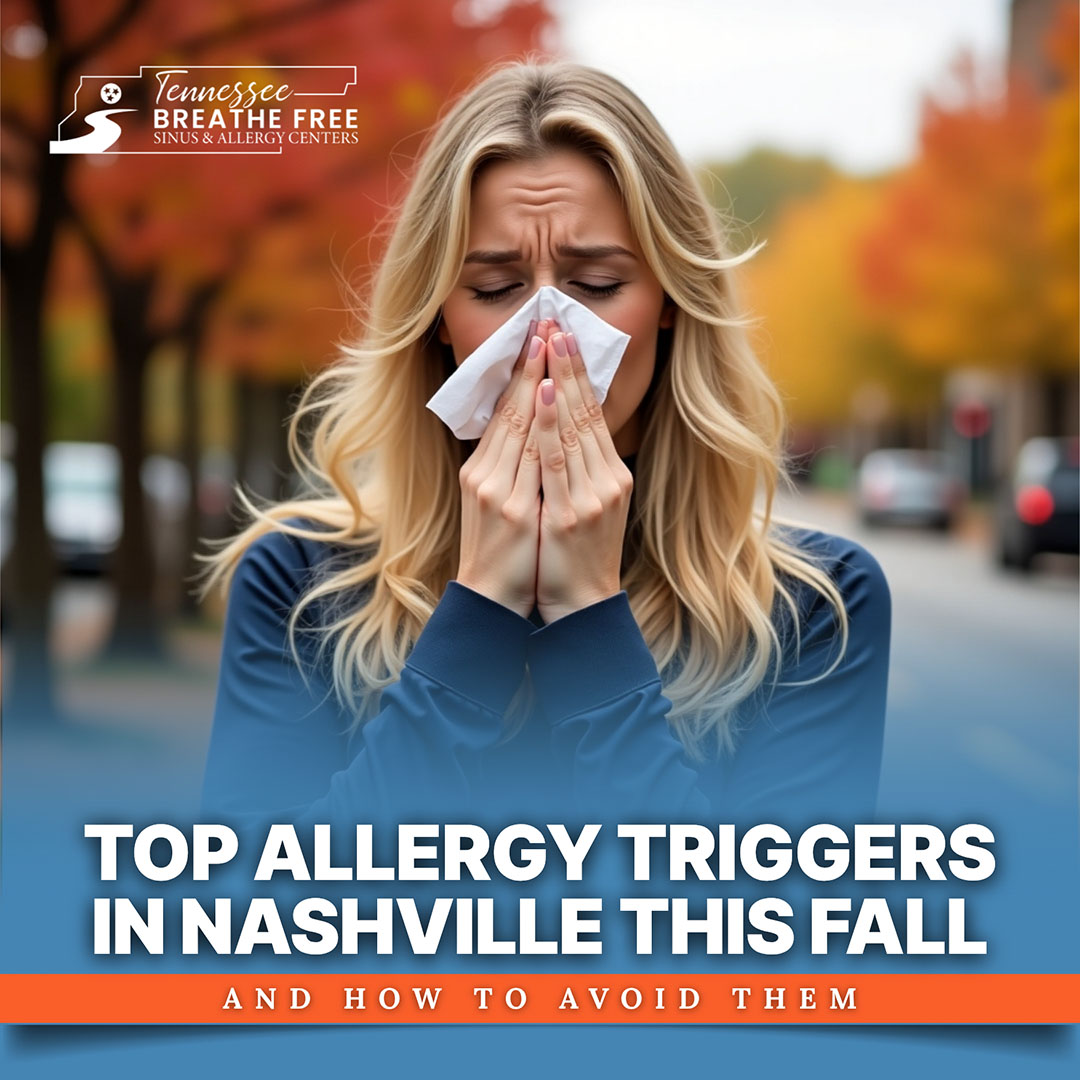🍁 Top Allergy Triggers in Nashville This Fall and How to Avoid Them

Fall has officially arrived in Nashville, bringing crisp air, colorful leaves, and — for many residents — an unwelcome spike in allergy symptoms. As the temperature cools and vegetation changes, a variety of allergens begin to circulate more heavily in the air.
Tennessee is considered one of the most challenging states for seasonal allergy sufferers, and Nashville consistently ranks high on national allergy indexes. Why? A long growing season, abundant plant life, and relatively mild winters give allergens plenty of time to spread — with fall being one of the peak allergy periods.
🤧 Common Fall Allergy Symptoms in Nashville
If you’re sensitive to seasonal allergens, you might notice:
- Frequent sneezing
- Runny nose (clear, watery discharge)
- Nasal congestion
- Itchy, watery eyes
- Scratchy or sore throat
- Coughing
- Sinus headaches
🌾 Fall Allergy Triggers to Watch for in Nashville
- Ragweed Pollen
Ragweed is the most significant fall allergen in Tennessee. Its lightweight pollen can travel for hundreds of miles, affecting residents even if the plant isn’t growing nearby. Symptoms often persist until the first hard frost.
- Outdoor Mold
Fallen leaves and increased humidity create the perfect breeding ground for mold. As leaves decompose, mold spores are released into the air — a common problem during the damp fall months.
- Indoor Allergens
As people spend more time indoors, exposure to dust mites, pet dander, and indoor mold increases. These allergens can worsen symptoms when combined with outdoor triggers.
✅ Allergy Relief Tips for Nashville Residents
Living in a high-allergy area doesn’t mean you have to suffer. Here are practical, ENT-recommended strategies:
✔️ Get Allergy Testing
Understanding your unique triggers is key. Comprehensive allergy testing allows your ENT to create a personalized treatment plan tailored to your environment and sensitivities.
✔️ Monitor Pollen Counts Daily
Use trusted sources like Pollen.com or local weather apps to track allergen levels. Limit outdoor time on high-pollen days and plan errands for times when levels are lower — typically later in the afternoon.
✔️ Take Allergy Medications Proactively
Don’t wait for symptoms to spike. Start taking antihistamines or nasal corticosteroids early in the season. Continue as needed during high-pollen days.
✔️ Use Over-the-Counter Relief Options
Decongestants, saline nasal sprays, and antihistamines can provide short-term relief. Eye drops and pain relievers may also help if you’re experiencing sinus pressure or discomfort.
✔️ Keep Your Home Allergen-Free
- Vacuum and dust regularly using a HEPA filter
- Wash bedding weekly in hot water
- Bathe pets frequently and keep them off furniture
✔️ Shut Windows and Doors
On high-allergen or windy days, keep your home sealed to prevent outdoor pollen and mold spores from entering.
✔️ Wear Protective Clothing Outdoors
If you’ll be outdoors, especially in wooded or grassy areas, wear sunglasses, hats, and even a dust mask to reduce exposure.
✔️ Rinse Off After Being Outside
Showering and changing clothes after outdoor exposure can remove pollen and prevent allergens from lingering on your skin or clothing.
✔️ Strengthen Your Immune System
Support your immune response with:
- A healthy diet rich in fruits and vegetables
- Proper hydration
- 7–9 hours of sleep per night
- Regular exercise
🩺 When to See an ENT in Nashville
If your allergy symptoms don’t improve with home care or OTC medications, it’s time to consult a specialist. Chronic congestion, sinus infections, and persistent fatigue may indicate more complex allergy or sinus conditions.
At Tennessee Breathe Free, we help Nashville-area residents uncover the cause of their allergies and find effective, long-term solutions.
👉 Schedule a consultation today and take the first step toward clear breathing and symptom relief.


